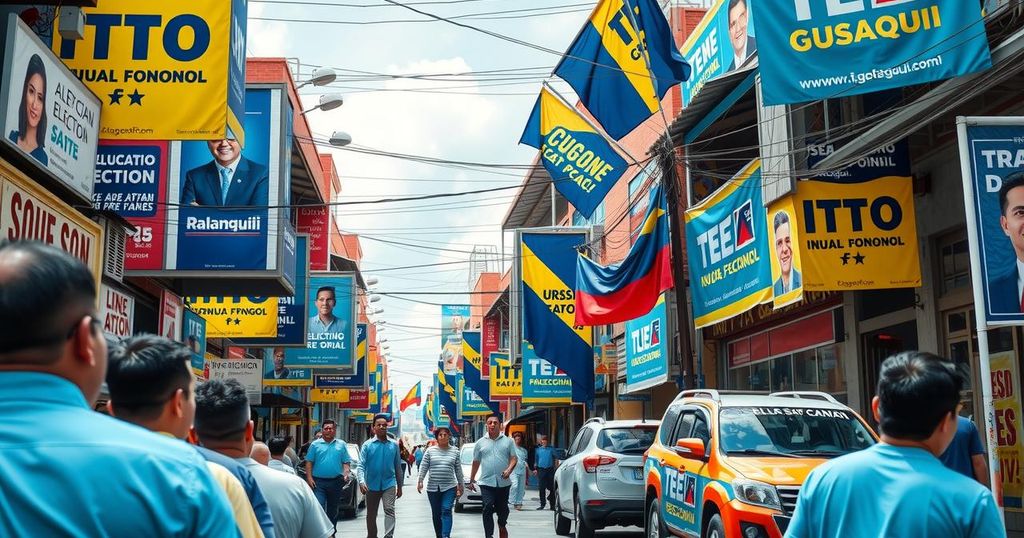Rawayana, a Venezuelan band of émigrés, faced political backlash from Nicolás Maduro, leading to a canceled tour. Despite this, they have maintained their artistic identity and emerged as a voice for Venezuelans abroad. Recently winning a Grammy and collaborating with Bomba Estéreo, the band continues to inspire hope through music, addressing both joy and hardship.
Rawayana, a popular Venezuelan band made up of émigrés, has achieved significant global success with their distinct Caribbean-inspired pop music. They were recently nominated for a Grammy and set to perform at Coachella, alongside releasing a collaborative album with Colombian group Bomba Estéreo. Despite their success, the band faced political backlash when Venezuelan leader Nicolás Maduro publicly criticized them, leading to the cancellation of their anticipated tour shortly before its starting date.
Alberto “Beto” Montenegro, the band’s leader, expressed his understanding of Maduro’s attacks, attributing them to the harsh realities faced by Venezuelans who have fled the country’s turmoil. Rawayana’s band members belong to a vast diaspora, with nearly 8 million Venezuelans having left due to political and economic crises. They continue to provide solace through their music, maintaining hope as they inspire their compatriots in exile.
The band’s roots trace back to their early days, creating music while Venezuela experienced significant political shifts. Their upbeat tracks served as an escape from the harsh conditions of their homeland. Their debut album, released in 2011, encapsulated this sentiment with the title “Licencia Para Ser Libre,” meaning “Permission to Be Free.” As their popularity grew, so did the despair in Venezuela, prompting many band members to leave the country.
Living between Miami and Mexico City, Rawayana used their position to advocate for fellow Venezuelans while sustaining their musical careers. They have performed globally wherever expatriate Venezuelans reside, bringing joy through their vibrant and uplifting performances. The band remained focused on creating danceable music while increasingly addressing political issues within their lyrics, highlighting societal challenges back home.
Montenegro’s lyrical sentiments reflect the struggle of many Venezuelans. One of their politically charged tracks suggests an inequitable lifestyle enjoyed by the elite, contrasting starkly with the everyday realities of the populace. As the political landscape became increasingly fraught, including allegations of electoral fraud against Maduro, Rawayana remained vocal. They utilized their platform to critique these injustices while reaffirming their artistic identity.
The group’s song “Veneka,” featuring artist Akapellah, aimed to reclaim a derogatory term used against Venezuelan migrants. It challenges stereotypes and celebrates resilience. However, Maduro criticized this track, labeling it derogatory. Following these events, Rawayana fell into a period of despondency, feeling the weight of political controversy impacting their artistic expressions.
Despite the challenges, Rawayana found reason for optimism: they became the first Venezuelans to win a Grammy for best Latin rock or alternative album. During their acceptance speech, Montenegro honored fellow Venezuelan artists, encouraging resilience among his compatriots.
With new collaborations on the horizon, Rawayana is gaining further recognition. Their recent partnership with Bomba Estéreo resulted in an album, “Astropical,” and a burgeoning tour. Such collaborations have deepened cultural ties and highlight shared experiences of adversity faced by both Colombian and Venezuelan nations. Montenegro conveyed a profound message regarding their supportive fanbase, emphasizing, “We have the support of the people, so I do not mind that much.”
Rawayana has successfully navigated substantial hurdles, both artistically and politically, becoming a significant voice for Venezuelans in diaspora. Their resilience and commitment to creating uplifting music amid adversity showcase not only their talent but their deep connection to their roots. They have proven that music can serve as a powerful form of expression and solidarity, even in the face of oppressive circumstances.
Original Source: www.latimes.com




